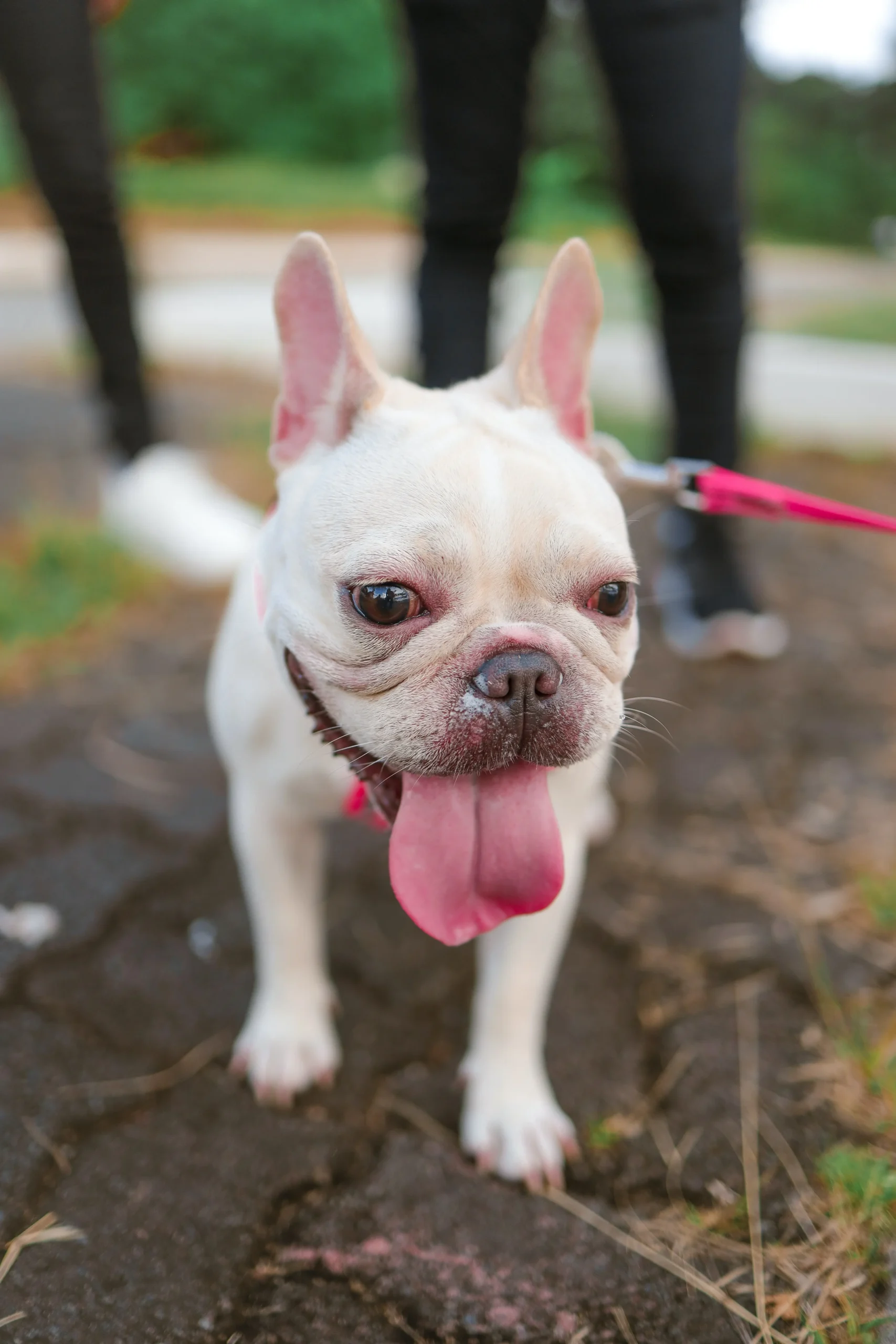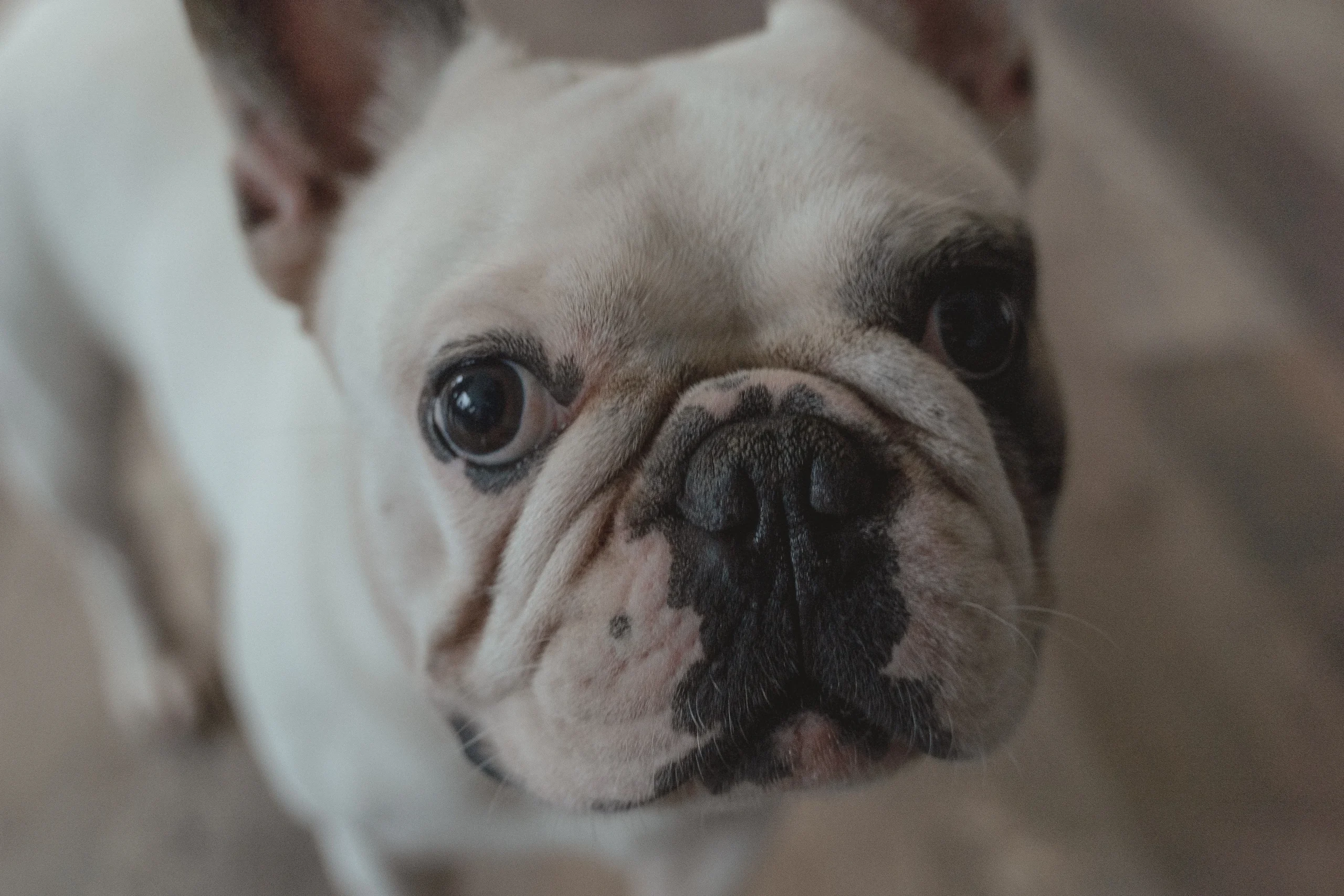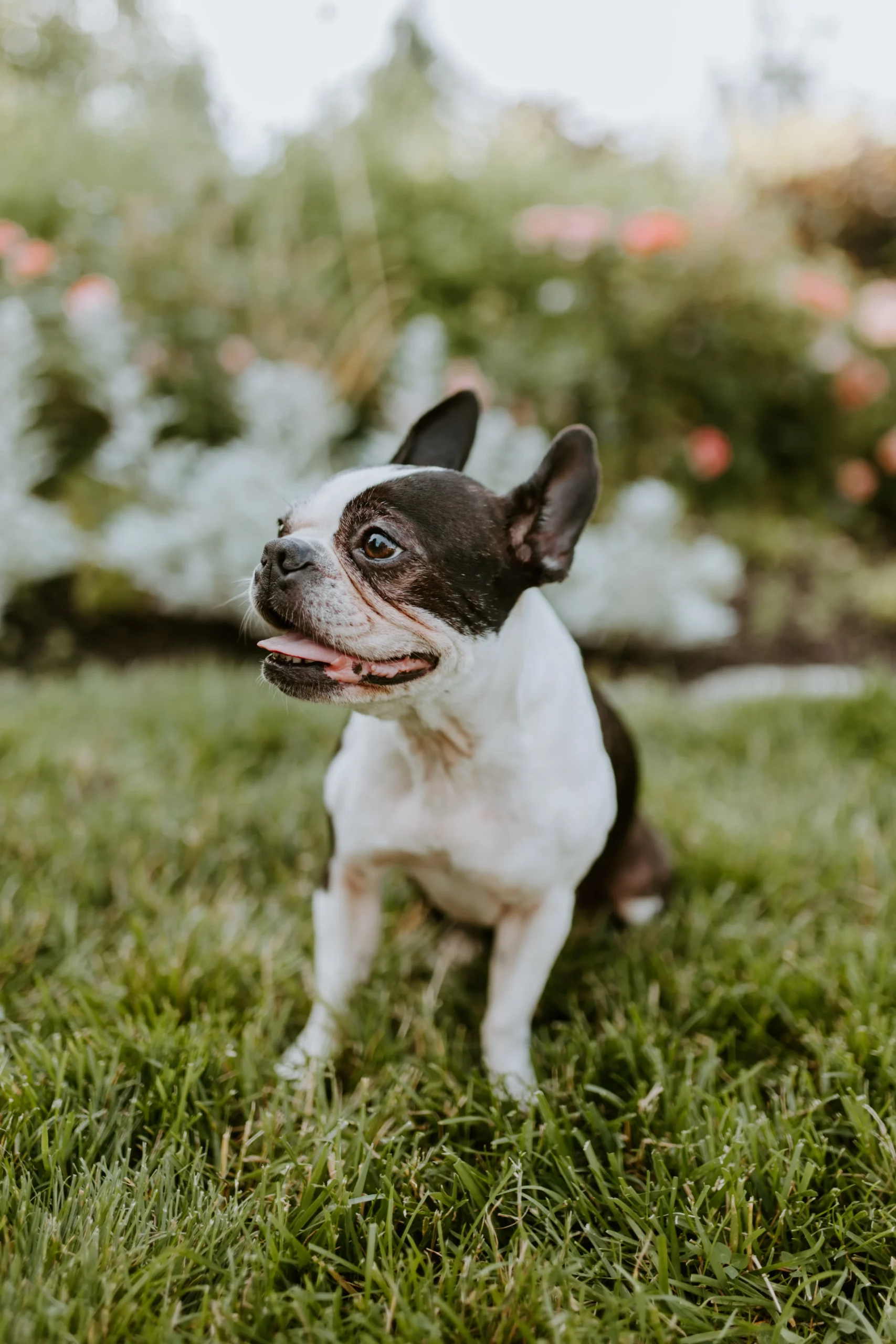History
The French Bulldog, often simply referred to as the “Frenchie,” is a charming and iconic breed with a rich history dating back to the 1800s. Its roots can be traced to the city of Nottingham, England, where lace workers emigrated during the Industrial Revolution. These workers brought along small bulldog-type dogs, which served as companions and ratters in their new homes.
As these lace workers relocated to France, particularly in the Nottingham region, their beloved bulldogs came with them. In France, these dogs quickly gained popularity among the working class, including the artisans and lacemakers. This transition marked the beginning of the breed’s association with France and its eventual name, the “French Bulldog.”

Over time, French Bulldogs were selectively bred for their distinctive traits, including their compact size, bat-like ears, and charming, expressive faces. They became a favorite among Parisian society, and by the late 19th century, they were sought-after companions of artists, writers, and fashionable ladies.
In the early 1900s, French Bulldogs crossed the Atlantic and found their way to the United States, where they gained a devoted following. The American Kennel Club officially recognized the breed in 1898.
Throughout its history, the French Bulldog has evolved from a humble working-class companion to a beloved and cherished companion animal worldwide. Today, this breed is known for its affectionate and friendly nature, making it a popular choice for families and individuals alike. Its distinctive appearance and endearing personality continue to captivate dog enthusiasts, ensuring that the French Bulldog remains a beloved and iconic breed with a storied history.
French Bulldog size
The French Bulldog, often referred to as the “Frenchie,” is a small breed of dog known for its unique appearance and charming personality. In this article, we will delve into the size of the French Bulldog, covering various aspects such as height, weight, and overall proportions.

Height
The height of a French Bulldog is a defining characteristic of the breed. These dogs are considered small in stature but are known for their sturdy and compact build. On average, a fully grown French Bulldog stands between 11 to 12 inches (28 to 31 centimeters) tall at the shoulder. This measurement is taken from the ground to the top of the shoulder blades, which is also known as the withers.
Weight
When discussing the size of a French Bulldog, weight is another crucial factor to consider. Frenchies are not particularly heavy dogs, but they do have a dense and muscular body. On average, the weight of a French Bulldog typically ranges between 16 to 28 pounds (7 to 13 kilograms). However, there can be some variation among individual dogs, with some Frenchies falling slightly outside this range.
Proportions and Build
French Bulldogs have a distinctive appearance characterized by a compact and well-proportioned body. They have a broad chest, a short back, and a sturdy bone structure. Their legs are relatively short and straight, which contributes to their low stature. Their tail is usually short and may have a slight curve, but it should not be docked.
Size in Relation to Health
Maintaining an appropriate size is essential for a French Bulldog’s overall health and well-being. These dogs are prone to certain health issues, and excessive weight or unusually large size can exacerbate these problems. Responsible breeders and owners should ensure that their French Bulldogs are within the recommended height and weight ranges to minimize the risk of health complications.
Nutrition and Diets
French Bulldogs, known for their adorable bat-like ears and affectionate nature, require special attention when it comes to their nutrition and diets. Proper feeding plays a crucial role in maintaining their overall health and well-being. In this comprehensive guide, we will delve into the essential aspects of French Bulldog nutrition, offering valuable insights to ensure your furry friend thrives.
- Understanding French Bulldog Dietary Needs
Before delving into the specifics of their diets, it’s vital to understand the unique dietary needs of French Bulldogs. These small, sturdy dogs have distinct characteristics that influence their nutritional requirements:

Size: French Bulldogs are small breed dogs, which means they require nutrient-dense food in smaller portions.
Sensitivity: They can be sensitive to certain ingredients, so choosing the right food is crucial to prevent allergies and digestive issues.
Activity Level: French Bulldogs are not very active, so their calorie intake should match their energy expenditure to avoid obesity.
- Choosing the Right Dog Food
When selecting dog food for your French Bulldog, prioritize high-quality options that meet the following criteria:
Protein: Opt for dog foods with high-quality animal protein sources like chicken, turkey, or fish. Aim for at least 18% protein content.
Fat: A moderate amount of healthy fats, around 5-8%, is essential for maintaining their energy levels and coat health.
Carbohydrates: Look for easily digestible carbohydrates like sweet potatoes, brown rice, or oats. Avoid foods with excessive fillers.
Avoid Allergens: French Bulldogs are prone to food allergies, so avoid common allergens like wheat, soy, and corn.
Consult Your Vet: Consult your veterinarian for food recommendations tailored to your Frenchie’s specific needs.
- Feeding Schedule
Establishing a consistent feeding schedule is crucial for your French Bulldog’s digestion and weight management. Divide their daily food portion into two or three meals to prevent overeating and minimize the risk of bloat, a condition that can be more common in brachycephalic breeds like French Bulldogs.
- Special Considerations
Hydration: Always provide fresh, clean water for your Frenchie. They can be prone to overheating, so proper hydration is essential.
Weight Management: Monitor your French Bulldog’s weight and adjust their portions accordingly to maintain a healthy body condition.
Treats: Choose healthy, low-calorie treats for training and rewards, and avoid overindulging.
Supplements: Consult your vet before adding any supplements to your Frenchie’s diet. Some may benefit from joint supplements or specific vitamins.
- Common Dietary Issues
Flatulence: Due to their unique anatomy, French Bulldogs are prone to flatulence. Choosing a low-fiber diet and feeding smaller, more frequent meals can help alleviate this issue.
Allergies: Watch for signs of food allergies, such as itching, ear infections, or digestive upset. If suspected, work with your vet to identify and eliminate allergens.
- Transitioning to a New Diet
If you decide to change your French Bulldog’s diet, do so gradually over a week to prevent digestive upset. Mix a small portion of the new food with their old food, gradually increasing the new food’s ratio.
proper nutrition is vital to ensure your French Bulldog enjoys a happy and healthy life. Understanding their unique dietary needs, selecting high-quality food, establishing a feeding schedule, and addressing special considerations are essential steps in providing the best nutrition for your beloved Frenchie. Remember that consulting with your veterinarian is always a wise decision to tailor your dog’s diet to their specific requirements.
Training and Intelligence
French Bulldogs, often affectionately known as “Frenchies,” are a small breed of dog with a charming and friendly personality. While they are not considered one of the most intelligent breeds in terms of obedience and complex commands, they possess their own unique form of intelligence and can be successfully trained with the right approach.

- Temperament and Adaptability: French Bulldogs are known for their adaptable and sociable nature. They are generally well-behaved and have a friendly disposition, making them suitable companions for various lifestyles, including apartment living. Their willingness to adapt and be around people is one of their strengths when it comes to training.
- Basic Obedience: French Bulldogs are capable of learning basic obedience commands such as sit, stay, and come when called. However, they may not consistently obey these commands unless they find them rewarding or enjoyable. Positive reinforcement techniques, such as using treats or praise, work well with Frenchies as they respond positively to rewards and encouragement.
- House Training: Housebreaking or potty training is an essential part of training for any dog breed, including French Bulldogs. These dogs are generally quick learners when it comes to understanding where to eliminate, but consistency and patience are key. Establishing a routine and providing positive reinforcement for appropriate bathroom behavior are effective methods for house training.
- Socialization: Socialization is crucial for French Bulldogs to ensure they are comfortable around other dogs and people. Early exposure to various environments, situations, and interactions can help prevent fear or aggression issues later in life. Enrolling them in puppy socialization classes can be beneficial for their development.
- Training Challenges: French Bulldogs have a reputation for being somewhat stubborn or independent-minded, which can present training challenges. They may not always respond to commands immediately, and some individuals may require more patience and consistent training efforts. It’s essential to avoid harsh or punitive training methods, as they can be counterproductive and harm the bond between you and your Frenchie.
- Focus on Positive Reinforcement: Positive reinforcement is the most effective approach to training French Bulldogs. This involves rewarding desired behaviors with treats, praise, or affection. Since Frenchies are food-motivated, using small, tasty treats can be especially effective in reinforcing good behavior. Consistency and repetition are key, and it’s important to catch and reward positive behaviors as they occur.
- Training for Mental Stimulation: While French Bulldogs may not excel in obedience competitions, they benefit from mental stimulation. Puzzle toys, interactive games, and training exercises that engage their minds can help keep them happy and prevent boredom-related behavioral issues.
- Training for Good Manners: Beyond basic commands, it’s important to focus on teaching your French Bulldog good manners. This includes leash walking without pulling, not jumping on people, and being well-behaved in various social settings. Consistent training and socialization from a young age can help instill these manners.
- Barking Behavior: French Bulldogs can be prone to excessive barking if not properly trained. Teaching them the “quiet” command and rewarding them when they stop barking can help manage this behavior.
- Adaptive Intelligence: While French Bulldogs may not excel in obedience trials, they often display a different type of intelligence known as adaptive intelligence. This means they are quick to understand their environment and adapt to it. They are also skilled at reading human emotions and responding with empathy and affection.
Health and lifespan
The health and lifespan of French Bulldogs, often affectionately called “Frenchies,” are essential considerations for anyone interested in owning this unique breed. French Bulldogs are a small, charming breed known for their distinctive appearance, friendly disposition, and adaptability to various living environments. However, like all dog breeds, they have specific health concerns and a typical lifespan that potential owners should be aware of.
Lifespan:
The average lifespan of a French Bulldog is typically between 10 to 12 years. However, individual lifespans can vary due to several factors, including genetics, diet, exercise, and overall care. Some French Bulldogs may live longer, while others might have shorter lifespans, depending on their specific health circumstances and the quality of care they receive throughout their lives.
Health Concerns:

French Bulldogs are brachycephalic dogs, which means they have flat faces and short noses. This unique facial structure can lead to various health issues, including:
- Respiratory Problems: Brachycephalic dogs, including French Bulldogs, are prone to breathing difficulties due to narrowed air passages. This can lead to snoring, snorting, and labored breathing, especially in hot or humid conditions. Owners should be cautious about exposing their Frenchies to extreme temperatures and provide plenty of cool, well-ventilated spaces.
- Heat Sensitivity: French Bulldogs are highly sensitive to heat and can quickly become overheated. It’s crucial to avoid strenuous exercise in hot weather and ensure they have access to shade and water. Never leave them in a car on a warm day, even for a short time.
- Skin Issues: French Bulldogs often have sensitive skin, which can be prone to allergies, rashes, and irritations. Regular grooming and using gentle, hypoallergenic shampoos can help keep their skin healthy.
- Orthopedic Problems: These dogs can develop orthopedic issues like hip dysplasia or intervertebral disc disease. Maintaining a healthy weight and providing them with appropriate exercise can reduce the risk of these conditions.
- Eye Conditions: French Bulldogs may be susceptible to certain eye conditions, including cherry eye and cataracts. Regular eye examinations by a veterinarian are essential for early detection and treatment.
- Digestive Problems: Some French Bulldogs are prone to gastrointestinal issues, including flatulence and food sensitivities. Feeding them a high-quality, easily digestible diet can help manage these concerns.
- Reproductive Challenges: Due to their unique body shape, many French Bulldogs require cesarean sections (C-sections) to give birth safely. Breeding French Bulldogs should only be done with careful consideration of these potential complications.
- Allergies: Frenchies can develop allergies to environmental factors, such as pollen or dust mites, which may require ongoing management and treatment.
- Obesity: French Bulldogs have a tendency to gain weight, so it’s crucial to monitor their diet and provide regular exercise to maintain a healthy weight.
- Brachycephalic Obstructive Airway Syndrome (BOAS): This syndrome encompasses a range of breathing-related issues in brachycephalic breeds, including French Bulldogs. BOAS can be severe in some cases and may require surgical intervention to alleviate symptoms and improve quality of life.

Preventive Care:
To ensure the health and longevity of your French Bulldog, it’s essential to prioritize preventive care. This includes:
- Regular Vet Check-Ups: Schedule routine veterinary visits for vaccinations, health assessments, and dental care.
- Proper Diet: Feed your Frenchie a balanced, high-quality dog food appropriate for their age, size, and activity level. Consult with your veterinarian for dietary recommendations.
- Exercise: While French Bulldogs don’t require intense exercise, regular, low-impact activities like short walks and playtime are essential for their physical and mental well-being.
- Temperature Management: Be cautious of extreme temperatures, both hot and cold, as French Bulldogs are sensitive to temperature changes. Protect them from overheating and provide warm shelter in cold weather.
- Grooming: Regular grooming, including cleaning wrinkles and ears, is essential for preventing skin issues and maintaining overall hygiene.
- Weight Management: Maintain a healthy weight for your Frenchie to prevent obesity-related health problems.
- Dental Care: Brush your dog’s teeth regularly and provide dental chews or toys to help prevent dental issues.
Conclusion
In conclusion, the French Bulldog, often affectionately referred to as the “Frenchie,” is a captivating and beloved breed known for its distinctive appearance and charming personality. These small, sturdy dogs have captured the hearts of people worldwide, making them one of the most popular and recognizable breeds today.

French Bulldogs are characterized by their bat-like ears, flat faces, and compact bodies, which contribute to their unique and endearing appearance. Their short, smooth coats come in various colors and patterns, further adding to their appeal.
Beyond their appearance, French Bulldogs are renowned for their friendly and affectionate nature. They are excellent companions, forming strong bonds with their owners and often getting along well with children and other pets. Their playful and adaptable temperament makes them suitable for both city and suburban living, as they require relatively little exercise compared to some other breeds.
However, it’s essential to recognize that their flat faces can lead to health concerns, including brachycephalic syndrome, which can affect their breathing. Responsible breeding and proper care are crucial to mitigate these risks and ensure the well-being of French Bulldogs.



